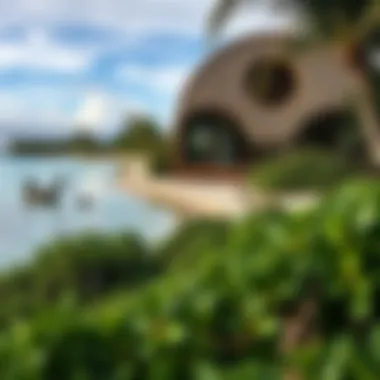Discovering the World of Private Islands for Sale


Intro
The pursuit of private islands holds a certain allure that captivates the wealthy and adventurous alike. While the concept might seem like a fantasy spun from the pages of a storybook, the reality is richer and far more complex. This guide aims to unpack the intricacies of purchasing private islands, particularly in the limelight of Dubai's upscale real estate market. As high-net-worth individuals stroll along the shores of luxury, the idea of owning a slice of paradise becomes not just a dream, but an attainable reality.
Understanding the landscape is essential for anyone interested in acquiring such properties. Factors that play into the valuation of these islands are manifold, ranging from geographical location to amenities available. Market trends evolve, and the potential uses for islands can vary widely – from personal retreats to investment opportunities. In a panorama where opulence meets exclusivity, being informed is the first step toward making the right decisions.
As we navigate through this comprehensive guide, we will explore market analyses, lifestyle offerings, and financial implications of diving into island ownership. Whether you’re an investor looking to enhance your portfolio or a homebuyer seeking that dream escape, this guide has everything you need to make an informed choice.
Market Analysis
Understanding the current trends in the private island market is crucial for making educated decisions. With a significant portion of the elite drawn to Dubai's booming property sector, private islands have emerged as beacons of investment potential.
Current Trends in Investment Opportunities
In recent years, there has been a marked increase in demand for private islands nestled in various parts of the globe, spurred by changing vacation habits and the influence of the COVID-19 pandemic. Beyond mere leisure, many buyers view these islands as opportunities for generating income, creating luxury rentals or hospitality ventures. The exquisite allure of these properties is underscored by a growing trend towards sustainability and eco-friendly developments. Investors are showing interest not only in the natural beauty of these islands but also in how they can develop them responsibly to cater to an increasingly environmentally conscious clientele.
Impact of Economic Factors on Property Prices
Economic downtowns can send ripples through luxury markets like private island sales. Factors such as currency fluctuations, global economic stability, and even geopolitical events can heavily influence property values. In Dubai, a city noted for its luxurious lifestyle, fluctuations in oil prices and tourism trends serve as barometers for real estate health. Prices can swing dramatically based on such variables. Investors must remain acutely aware of these trends and understand how they affect not just market prices but also the future potential of their investments.
"Investment in private islands is not just about buying real estate; it’s about acquiring an experience, a lifestyle, and sometimes even a piece of art set against the canvas of nature."
As we continue our exploration, we will delve deeper into the lifestyle features that accompany life on a private island, especially in prime locations like Dubai. The marbled skies and the shimmering waters aren't just a backdrop; they create a lifestyle that is unique, filled with cultural and recreational offerings tailored for those residing in such exclusive locales.
Understanding Private Islands
When one begins to explore the world of real estate, the concept of private islands often evokes images of luxury, exclusivity, and serene solitude. However, the understanding of private islands goes beyond mere aesthetics and paves the way for savvy investments and unique lifestyles. In this section, we’ll dissect their significance and the many facets that make them worth considering.
Private islands serve as a unique investment opportunity that attracts a specific group of buyers, ranging from affluent individuals seeking a tranquil escape to developers exploring luxury resort ventures. Owning one can transform not just your retirement plan, but your entire way of life. Investors are often drawn by the allure of pristine beaches and untouched nature, where they can establish a retreat far away from the hustle and bustle of city life.
It’s important to grasp that these islands come with specific challenges and considerations. Understanding the dynamics of private island ownership helps potential buyers navigate legal frameworks, environmental issues, and the responsibilities tied to such a unique property. It can’t be overstated how vital it is to be informed about these elements prior to diving in.
Definition of Private Islands
A private island is, at its core, a landmass surrounded entirely by water that is owned by an individual or entity. This definition may sound straightforward, but the nuances of ownership can vary significantly. Outright ownership is the most traditional form, but it’s also possible to have shared ownership agreements. Some islands serve as a single residence, while others may host multiple structures, catering to more than just the owner.
Private islands can range widely in size and development status. They might be a small patch of land with nothing but sandy shores or a more substantial island with infrastructure like homes, docks, and utilities. The beauty is in the variety, though, as each island character has its story and value, depending on its geographical location and what it offers.
Historical Context of Island Ownership
The history of private island ownership can be traced back to ancient times when land primarily equated to wealth and power. Early settlers often laid claim to small islands for fishing grounds or agricultural use. Over “generations” and conflicts, ownership shifted, leading to the modern understanding of private islands as exclusive havens.
In more recent history, especially from the 20th century onwards, island acquisition became more common among the wealthy elite. Notable figures, like Richard Branson with his Necker Island, brought the ownership of private islands into the limelight. This trend has only intensified as economic forces have shifted to favor high-net-worth individuals seeking unique assets that signify status.
Furthermore, contemporary buyers are increasingly mindful of the environmental impacts associated with island development. Sustainability and conservation efforts are becoming essential conversations among investors. The historical journey of private islands reflects changing societal values, from mere possession of land to a deeper responsibility for preserving natural habitats.
In summary, understanding private islands encompasses their definition, the historical evolution of ownership, and the current complexities tied to such extraordinary investments. It sets the foundation for delving deeper into the market dynamics, financial considerations, and legal frameworks that shape this exclusive realm.
Market Overview
Understanding the dynamics of the private island market is crucial for anyone considering investment in such exclusive properties. This section dives into the nuances of private island sales, highlighting current trends and sought-after locations that paint a comprehensive picture of the landscape.
Current Trends in Private Island Sales
The world of private islands is undergoing a noticeable shift, with several emerging trends shaping its future. Investors are increasingly treating these islands not just as vacation getaways, but as viable financial investments. One key trend is the growing interest in sustainable living. Potential buyers are seeking islands that offer the possibility of eco-friendly development, incorporating renewable energy sources and sustainable building practices. This reflects a broader societal shift towards environmental consciousness, pushing both buyers and developers to rethink their approaches.
Another trend is the rise of digital unprecedented accessibility. With the virtual landscape changing how properties are marketed, island-related sales utilize sophisticated online platforms that showcase listings with high-quality imagery and detailed descriptions. This not only aids potential buyers but also widens the audience significantly. Buyers from diverse geographical regions can explore private island options without needing to set foot on the property initially. Furthermore, luxury markets are constantly adapting to meet the tastes of younger investors who value unique experiences along with quality, thus influencing the type of islands being developed or sold.
"The private island market is not just about beauty and seclusion anymore; it's becoming a space for innovation and lifestyle, catering to a clientele that is increasingly discerning."
To navigate these changing tides, understanding market fluctuations—such as pricing trends and buyer demographics—is essential. For instance, some islands are starting to fetch higher prices due to their unique features or locations that promise greater exclusivity. When it comes to investment, trends illustrate a shift toward a more customized experience—where bespoke developments are becoming part of the allure.
High-demand Locations for Private Islands


Geography plays a significant role in determining the desirability of a private island. Certain areas have established themselves as hot spots, providing both beauty and potential for investment. The Caribbean continues to dominate the private island market, especially spots like The Bahamas and British Virgin Islands. These regions offer tropical climates and strong rental markets for resorts. Owning an island in such a revered location can lead to lucrative rental income, especially during peak tourist seasons.
Beyond the tropical allure, islands in places like Lake Michigan or the Pacific Northwest have garnered attention. These locations mix serene natural surroundings with proximity to urban centers, thus appealing to those who seek a balance between privacy and accessibility. Moreover, regions like Southeast Asia, especially the Philippines and Thailand, are catching the eye of investors due to their lower acquisition costs, coupled with increasing tourism.
High-demand locales can also vary based on the lifestyle offered: some buyers prioritize isolation and tranquility, while others seek proximity to vibrant cultures and amenities. As such, the narrative of buy-and-hold investment is shifting; many buyers now look for islands that can not only serve as personal retreats but can also provide substantial returns through rentals or future developments.
Ultimately, understanding these locations can make or break an investment decision. Keeping an eye on regions experiencing rapid development can offer greater opportunities, reinforcing the notion that location is indeed key in the realm of private islands.
Financial Considerations
When it comes to the acquisition of private islands, understanding the financial aspects is paramount. Buying a private island is not just about the initial purchase price; it involves a myriad of factors that can influence the overall cost of ownership. This section delves into the valuation of these unique properties, the ongoing costs for maintenance, and various financing options that potential buyers may explore.
Valuation Factors for Private Islands
Valuing a private island isn't as straightforward as appraising a standard piece of real estate. Several factors come into play that can dramatically influence its worth. Here are some key points to consider:
- Location: The adage "location, location, location" holds true even more so for islands. An island in an affluent area like the Caribbean will likely demand a higher price than one situated in a less desirable location.
- Size and Topography: Larger islands with interesting landscapes may fetch premium prices. Flat islands suitable for development might be seen as more desirable than rugged, less accessible terrains.
- Development Potential: Properties that can be developed — whether residential or commercial — may also attract higher valuations. An island with proper zoning can be a gold mine for investment.
- Access and Infrastructure: Proximity to ports, airports, and established utilities can play a huge role in determining value. An island with existing infrastructure will be worth more than one that lacks basic facilities.
In many cases, engaging with specialists in luxury real estate can provide insight into market trends and comparative valuations, ensuring that buyers are making informed decisions.
Cost of Maintenance and Upkeep
Owning a private island comes with its own set of challenges concerning maintenance and upkeep. While the allure of a secluded paradise is undeniable, it’s essential to recognize the financial commitments involved. Consider these factors:
- Regular Maintenance: Upkeep of buildings, landscaping, and utilities can be significant. Unlike traditional homes, remote islands may have specialized needs that incur higher recurring costs.
- Utilities and Services: Accessing water, electricity, and internet can be complicated and expensive. Without local infrastructure, buyers might need to install their own systems, contributing to steep initial and ongoing costs.
- Insurance: Insuring a remote property can be pricier than residential homes on the mainland. Factors such as natural disaster risk, remote access for emergency services, and limited availability of reliable contractors can elevate premiums.
Considering these costs before making a purchase is crucial. Potential buyers should engage with local contractors and service providers to get an accurate estimate of ongoing expenses tied to maintenance.
Financing Options and Strategies
Financing a private island can require a different approach than traditional real estate transactions. Many banks might be wary of financing due to the unique nature of these properties. Here are some strategies that may be effective:
- Private Financing: Some buyers enlist private lenders who specialize in luxury real estate. These financiers often have a greater understanding of the nuances involved in island purchases.
- Cash Purchases: For many wealthier buyers, paying cash can simplify the transaction process. Without financing, there’s less worry about loan approval or interest rates.
- Equity Lines of Credit: Some potential buyers might leverage existing properties or assets to obtain a line of credit to fund their purchase.
- Partnerships: Purchasing an island can be a shared venture among multiple investors, significantly reducing the financial burden on individual buyers.
Understanding available financing options is a key step for those interested in buying private islands. Talking to a financial advisor or real estate expert can help potential buyers navigate these choices effectively.
In summary, financial considerations are crucial to making a well-informed decision on purchasing a private island. Whether it's understanding valuation factors, ongoing costs, or financing strategies, a thorough analysis can pave the way for a successful investment.
For further insights, you can explore additional resources like Wikipedia or expert-financed discussions on Reddit.
Legal Framework
Understanding the legal framework surrounding private islands is crucial for anyone considering such a purchase. Ownership of a private island entails navigating a complex maze of laws, regulations, and international agreements that vary widely depending on the location. Ignoring these elements can lead to significant hiccups during the buying process and may even result in financial loss.
The primary benefit of grasping this legal terrain is that it empowers buyers to make informed decisions. Knowing the ownership rights can aid in evaluating whether the investment aligns with long-term goals. Moreover, understanding these regulations can also help mitigate potential risks associated with environmental restrictions and other legal obligations.
Ownership Rights and Regulations
When purchasing a private island, one must first delve into the ownership rights specific to that geographic location. Different nations and territories impose varying rules that can affect how a buyer can use and develop the island. For instance, in some jurisdictions, foreign ownership is heavily restricted or entirely prohibited.
Here are key aspects to consider regarding ownership rights:
- Legal Title: Check if the island has a clear legal title. This will involve a title search to ensure there are no encumbrances.
- Fee Simple vs. Leasehold: Understand whether the island is owned in fee simple (outright ownership) or as a leasehold. Leasehold arrangements can impose limitations on development and usage.
- Rights of Way: Ascertain if there are shared pathways or waterways and what rights accompany them.
- Cultural Significance: Certain islands may have historical or cultural significance which can impact ownership rights and usage.
Consulting with a legal expert familiar with real estate in the respective country is advisable to navigate these intricacies.
Zoning Laws and Environmental Concerns
Zoning laws are another critical layer in the legal framework relevant to private island ownership. These regulations dictate what can and cannot be built on the island and govern land use. Depending on where the island is located, there may be specific designations such as conservation areas or protected marine zones.
Some important factors in zoning laws are:
- Permitted Use: These laws will determine whether an island can be developed for residential, commercial, or recreational purposes.
- Environmental Impact Assessments: In many regions, an assessment may be required before any construction begins, particularly if the island is at risk of erosion or houses protected wildlife.
- Building Codes: Local building codes will outline what materials can be used, how structures must be built, and safety standards that must be adhered to.
Ignoring zoning laws can lead to severe penalties, including the inability to complete desired developments.


"Understanding zoning laws and environmental regulations is not just a legal necessity; it’s a moral duty to ensure the preservation of our natural habitats for future generations."
Moreover, environmental concerns are growing in importance as the world faces climate change and ecological destruction. Potential buyers should ensure their plans for the island align with sustainable practices to avoid contributing to these pressing global issues.
In summary, navigating the legal framework of private island ownership is not merely a box-ticking exercise; it is a fundamental step in securing an investment that is sustainable, enjoyable, and, most importantly, compliant with local laws.
Investment Opportunities
When considering private islands as potential investments, it is vital to grasp the myriad of opportunities they present. These islands aren’t just picturesque escapes; they are assets that can yield substantial returns under the right circumstances. By understanding the landscape of investment opportunities, one can navigate this unique marketplace with greater acumen.
Potential for Development
From a developmental standpoint, private islands offer one of the most versatile canvases available in real estate. If you have an eye for the future, the chance to transform an untouched island into a luxurious retreat or commercial property is a tantalizing prospect. Various factors play into this, such as location, size, and existing infrastructure.
- Location: An island's geographical position can significantly affect its value and appeal. Islands close to popular tourist spots tend to attract investment for boutique hotels or vacation rentals. For instance, a private island near the coast of Dubai can leverage the influx of tourism in a thriving economy.
- Size and Accessibility: Larger islands may present an opportunity for larger developments, while smaller islands might be perfect for cozy, exclusive resorts or private homes. However, accessibility also needs consideration; ease of transport can make or break the development potential.
- Infrastructure: Some islands come with existing amenities such as water, power, and even developed roads. These features can significantly reduce initial investment and speed up project timelines. When scouting for development opportunities, pay close attention to any zoning laws and environmental restrictions that might come into play.
Creating something distinctive on a private island can offer significant charm and attract an affluent clientele, turning it into a lucrative business proposition. With foresight and careful planning, there is a promising horizon for investment in island development.
Rental Income from Private Islands
Engaging in rental income models can lead to a steady cash flow while also generating profit from an island investment. Renters are often willing to shell out a premium for the privacy and exclusivity that private islands provide. The income potential varies significantly based on various factors:
- Type of Rental: Private islands can cater to different markets, including high-end tourism, corporate retreats, or even filming locations. Positioning the property for the right audience can optimize rental yield.
- Marketing: Effective marketing strategies are paramount. Engaging an experienced real estate agent or property manager who understands luxury listings can make all the difference in attracting the right clientele.
- Seasonality: Understand the seasonal trends of your island's location. For instance, islands in tropical regions may see peak rental periods during winter months in colder climates. This is crucial for setting rental rates and optimizing booking availability.
According to a study by Inner Sea Discoveries, renting a private island can generate income that far outweighs the maintenance costs. This assumes the right marketing strategies are applied. Just managing an island effectively can transform it from merely a luxury escape into a robust investment tool.
Luxury Features
When one considers the allure of private islands, the term "luxury features" inevitably comes to the forefront. This section aims to shed light on what luxury amenities and sustainable practices are standard fare on these exclusive pieces of real estate. These features do not merely add to the aesthetic appeal; they also offer practical benefits for those who wish to invest in a slice of paradise. From lavish accommodations to eco-friendly considerations, understanding these elements is crucial for prospective buyers.
Amenities Commonly Found on Private Islands
Private islands often come with a treasure trove of high-end features designed to provide comfort and opulence. Here is a closer look at some common amenities:
- Private Beaches: The most obvious luxury asset. These secluded stretches of sand offer a personal escape from the world, allowing for tranquil relaxation or adventurous water activities without the prying eyes of the public.
- Infinity Pools: Merging seamlessly with the horizon, infinity pools are often seen as a statement piece. They provide breathtaking views of the sea while offering a place to cool off in privacy.
- Gourmet Kitchens: Island living doesn’t mean sacrificing culinary excellence. Many private islands are equipped with state-of-the-art kitchens featuring high-end appliances and ample space—perfect for entertaining guests.
- Spa and Wellness Facilities: Many owners of private islands prioritize health and rejuvenation, leading to the installation of spas, yoga decks, or even meditation gardens.
- Docking Facilities: Given their remote locations, private islands usually feature docks or mooring areas. Whether it’s for personal yachts or visitor boats, such facilities enhance the accessibility of these retreats.
- Sustainable Resources: Many developers are now including solar panels, rainwater harvesting systems, and organic gardens—elements that not only enhance the living experience but also minimize the ecological footprint.
Having these amenities not only elevates the living experience but also adds significant value to the property.
Sustainable Living on Islands
The trend of sustainable living is gaining traction, especially among affluent buyers of private islands. This shift is driven not only by a desire for luxury but also a commitment to environmental stewardship. Here are some considerations:
- Eco-Friendly Construction: Many new private island developments prioritize renewable materials and sustainable building practices. Using local materials, such as bamboo or reclaimed wood, not only supports local economies but also reduces the carbon footprint of construction.
- Off-Grid Living Options: With advancements in technology, many islanders are now opting for off-grid solutions. This includes solar energy systems that power households without reliance on fossil fuels.
- Organic Landscaping: When planning an island property, builders often incorporate local flora and fauna into the landscaping. This approach helps preserve the island's natural charm while promoting biodiversity.
- Waste Management Systems: Efficient waste disposal and recycling systems are often essential for private islands. These systems not only ensure cleanliness but also protect surrounding marine environments.
Sustainable living on private islands is not just a passing fad; it's becoming an integral part of how islands are marketed and perceived. For discerning buyers, these elements contribute significantly to both lifestyle and investment value.
"Investing in a private island is not just about luxury; it’s about leaving a legacy for future generations while preserving nature."
The Purchase Process
Acquiring a private island is not just a transaction; it’s stepping into a unique realm that combines luxury with a slice of paradise. Hence, understanding the purchase process is crucial. It's like navigating through uncharted waters—every wave could bring new surprises. Knowledge of this process can make the difference between a smooth sailing or a tumultuous storm.
Steps Involved in Acquiring a Private Island
First and foremost, it’s essential to start with research. This is where a potential buyer dives into the specifics of islands available for sale. One should consider factors like location, price, and land use. Once a few islands garner interest, drafting a wishlist is beneficial. Items on this list can range from desired amenities to proximity to local services.
Next comes visiting the island. It’s not just about looking at photos online; experiencing the land firsthand could reveal characteristics that aren't apparent in listings. This step often solidifies a buyer's intentions. If everything feels right, it is time to make the next move.
The price negotiation phase is where things can get a bit dicey. Buyers may propose an offer, and this can lead to discussions back and forth. It's advisable to remain realistic and somewhat flexible. Buyers should think of it as a dance, with each side stepping in and out until a comfortable rhythm is established.
After settling on a price, the next step is inspections and assessments. Hiring professionals to evaluate the land's condition, hazards, and other critical attributes is necessary. Buyers should also consider potential zoning laws that could impact future developments.
Finally, one cannot overlook the closing process. This involves paperwork, contracts, and finalizing payments. It’s the last hurdle before the keys are handed over. Notably, ensuring all documents are in pristine order is vital to avoid any future surprises.


- Research available islands
- Visit the selected island
- Negotiate the price
- Conduct inspections
- Close the deal
In short, while the path to acquiring a private island may seem daunting at first glance, each step provides valuable insight and aids in informed decision-making.
Role of Real Estate Agents and Legal Experts
A well-informed real estate agent can make a world of difference when navigating the purchase of a private island. They essentially act as the lighthouse, illuminating crucial aspects of the process. An agent typically has extensive experience dealing with island-specific markets and can guide buyers through complexities that might otherwise go unnoticed.
On the other hand, enlisting a legal expert is just as imperative. They ensure that all legalities surrounding the island acquisition are adhered to and can manage contractual matters effectively. These experts can clarify ownership rights and zoning laws, which is significant in avoiding legal pitfalls.
Both professionals often collaborate, ensuring that buyers can make knowledgeable choices. They can provide valuable data, assist in negotiations, and help in the closing process as well.
In summary, engaging with real estate agents and legal professionals is not merely advisable but rather essential. Their expertise covers a variety of grounds—from finding suitable islands to ensuring that every legal footprint is accounted for.
Ultimately, the purchase of a private island doesn’t just signify owning a piece of land; it signifies investing in dreams, aspirations, and potentially, a legacy.
Cultural and Lifestyle Factors
Understanding cultural and lifestyle factors is crucial when it comes to purchasing a private island. These elements significantly influence not only the desirability of the island but also determine how it can be used by its owner.
Living on a private island often means embracing a different way of life. From the perspective of cultural factors, each island typically possesses unique characteristics, influenced by its geographical location, ecosystem, and historical context. For some buyers, the aesthetic appeal of Caribbean gems like Necker Island serves as an irresistible lure, while others may be drawn to the rugged charm of islands in the Norwegian fjords. Cultural influences such as the local traditions, architecture, and even the cuisine can shape the experience of living on an island, providing residents with both novelty and authenticity.
Moreover, lifestyle considerations play a pivotal role in the decision-making process. Those who thrive on solitude might find joy in an uninhabited island, basking in peaceful isolation. Conversely, for individuals who appreciate social interactions, semi-private islands with nearby communities might be more appealing. The lifestyle on the island can greatly influence day-to-day activities, leisure pursuits, and even social dynamics, creating a significant impact on one's overall satisfaction.
Living on a Private Island: Pros and Cons
When considering a private island, weighing the advantages and disadvantages is essential.
Pros:
- Natural Beauty: Often, private islands boast stunning landscapes that provide a breathtaking backdrop to everyday life.
- Privacy: Owners can enjoy a level of seclusion that is rarely found in mainland homes, allowing for peace and tranquility.
- Personalization: Given the limited access, you have the freedom to design and shape your living environment without outside interference.
Cons:
- Accessibility: Many islands might be hard to reach, which can be an inconvenience, especially during emergencies.
- Regulations and Maintenance: Some islands have strict regulations on development and environmental preservation, and upkeep can be costly and laborious.
- Limited Resources: Living on an island may mean less access to immediate resources and services, which can challenge daily living.
"Investing in a private island is not merely a financial decision; it is a commitment to a distinct lifestyle and its attendant challenges."
Community and Privacy Dynamics
The dynamics of community and privacy are two sides of the same coin when it comes to private islands. Depending on the location and ownership structure, the community can vary widely. Some islands are completely isolated, allowing for an uninterrupted connection with nature. Others may have nearby inhabitants or a developed community, facilitating social interaction and a sense of belonging.
Understanding how these dynamics interact is vital. For some owners, a strong sense of community can make island life more enjoyable. This is especially true for those who desire social interactions, as having neighbors nearby can foster connections and shared experiences.
On the other hand, a retreat into isolation may appeal more to individuals seeking respite from the hustle and bustle of modern life. Privacy allows for personal reflection, creativity, and an escape from societal pressures. For those contemplating the purchase of an island, being clear about their personal desires in terms of community versus solitude will help shape their choices.
Future Outlook
The future of private islands as a lucrative investment is a topic that deserves close examination. Understanding how this niche market operates, its evolution, and the factors influencing it is critical for potential buyers, developers, and investors. As the concept of private islands transforms, various shifts in buyer demographics, environmental considerations, and lifestyle preferences start to take shape. The importance of analyzing these trends cannot be overstated; they help one anticipate not just monetary value, but the intangible benefits of owning a slice of paradise.
One significant aspect to consider is the increasing interest in eco-friendly practices among wealthy buyers. More people are looking to own property that aligns with their ethical values, minimizing their carbon footprint while maximizing their personal enjoyment. In this light, the private island market might become increasingly saturated with sustainable features such as solar power, organic farming practices, and biodiversity conservation efforts. With rising awareness of climate change and environmental degradation, being a responsible island owner could turn into a trendy badge of honor.
Also, let's not overlook the role of technology in shaping future investments. The advent of remote working has allowed high-net-worth individuals to rethink where they want to live or spend vacations. These changes create a new demand for islands located in easily accessible yet secluded areas.
In essence, understanding the future outlook of private islands is not just about financial numbers; it's equally about aligning emotional and ethical investments with tangible benefits. Buyers can shape their lifestyles while adding long-term value to their portfolios, making intimate ownership of private islands rise in relevance.
Predictions for the Private Island Market
Looking ahead, predictions for the private island market tend to point toward growth driven by several factors. One such factor is improving logistics and transportation options. Owning an island is no longer the preserve of the ultra-wealthy who have to shoulder burdensome travel logistics; today’s advancements in travel technology make getting to and from these paradises more convenient.
Some trends to watch include:
- Increase in Global Affluence: As global wealth expands, more individuals from emerging markets are entering the luxury real estate arena. This trend creates increased competition and may drive islands' prices upward.
- Rise in Investment Diversification: Investors increasingly follow diversified investment strategies; luxury real estate, including private islands, is becoming a key element of many portfolios.
- Focus on Privacy and Exclusivity: The pandemic heightened people’s need for private spaces, impacting real estate preferences and driving up interest in private islands.
Emerging Trends Shaping Island Investments
As we move further into the future, emerging trends will dictate how island investments are perceived and executed. The following insights illustrate the landscape ahead:
- Sustainable Development: There's a growing push for environmentally friendly designs and constructions. Potential buyers will favor islands with properties that feature sustainable materials and practices.
- Technological Integration: Smart homes, connected security, and renewable energy sources will likely become the norm, adding modern conveniences that appeal to new buyers.
- Rental and Vacation Opportunities: Short-term rental possibilities are opening new revenue channels for owners, making islands not just a luxury item but a practical investment.
- Strategic Partnerships with Local Communities: Engaging local communities could lead to culturally rich and sustainable ties that benefit both owners and island residents.
The dots are connecting between lifestyle desires, investment strategies, and ethical responsibilities. Those who engage with these trends will likely find themselves with not just an investment, but a purposeful way of living.



